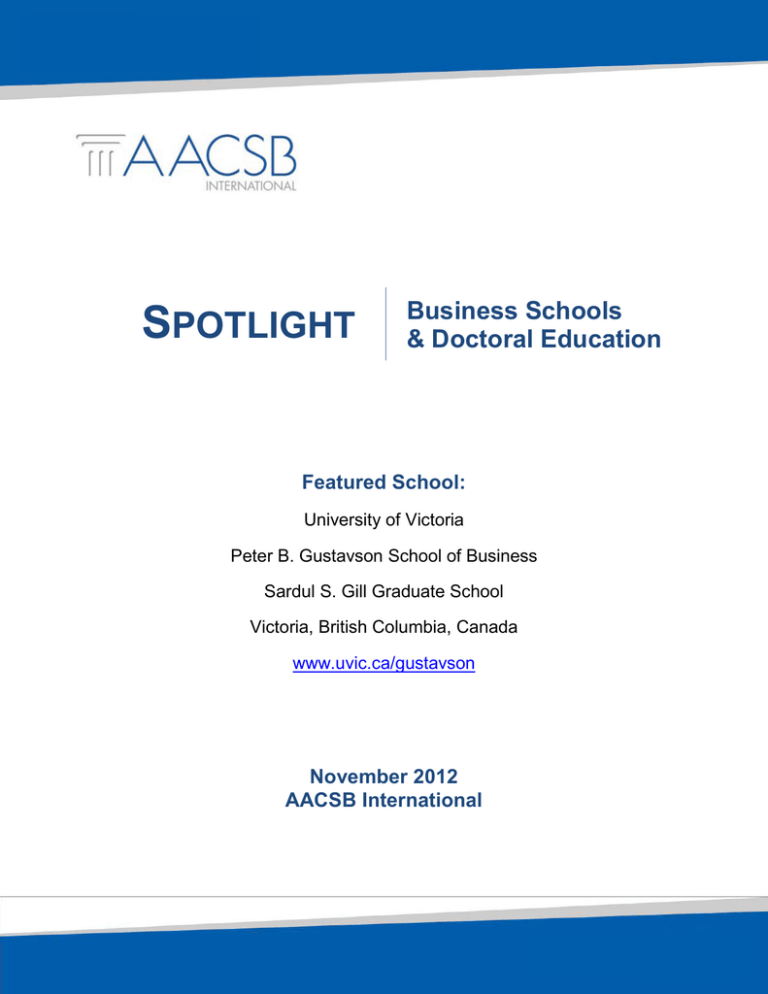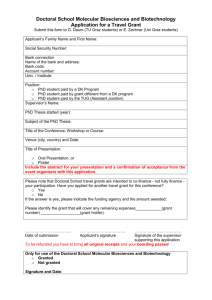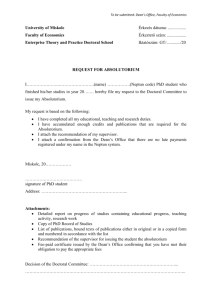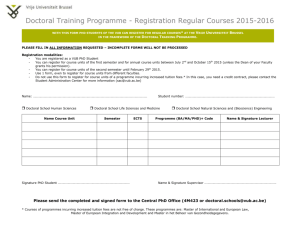
SPOTLIGHT
Business Schools
& Doctoral Education
Featured School:
University of Victoria
Peter B. Gustavson School of Business
Sardul S. Gill Graduate School
Victoria, British Columbia, Canada
www.uvic.ca/gustavson
November 2012
AACSB International
SPOTLIGHT | Business Schools & Doctoral Education
PhD in International Management and Organization at
the Sardul S. Gill Graduate School
University of Victoria’s Peter B. Gustavson School of Business
The Peter B. Gustavson School of Business’s strong commitment to promoting internationalization within
all of its programs is visible in the PhD in International Management and Organization, whose objective is
to “develop candidates with an integrated perspective on management to address complex global
1
issues.” As PhD Program Director Carmen Galang explains, two factors were behind the creation of the
PhD program in 2010. First, the School had many research-productive faculty, and felt that implementing
a business doctoral program would help strengthen the research culture. Additionally, high interest in
such a program was expressed by students and other stakeholders, and the School felt it could help meet
the demand for more PhD qualified faculty in business.
The Gustavson faculty were very active in building the doctoral program, and felt that the program should
approach business doctoral education in an integrated and international way. The program is strongly
positioned to students who wish to develop their academic careers in research and teaching, rather than
consulting or industry careers. The program looks for individuals who have a “keen interest in and
curiosity for research,” adds Galang, and the majority of students have a graduate degree in business as
well as prior business experience.
Program Structure
The PhD in International Management and Organization is a full time, four year program that focuses on
five areas: strategy, organizational behavior, organizational theory, human resources and cross cultural
management, and business and sustainability, all from an international perspective. PhD students are
funded through a combination of scholarships, research and teaching assistant fellowships, and teaching
opportunities. Students are guaranteed funding for up to four years on the condition that they maintain a
level of acceptable performance. Typical funding is around $20,000 CDN per year and is expected to
cover living and tuition expenses.
2
In the first two years, students pursue the coursework stage of the program, of which 18.0 units are
required in research methods and foundations, with some flexibility to select among other course
offerings depending on the chosen stream of study. Each stream involves the study of theoretical and
empirical foundation topics through a series of core courses:
•
Foundations of Research in International Management & Organization
•
Seminar in International Management
© AACSB International. All Rights Reserved.
Peter B.
SPOTLIGHT | Business Schools & Doctoral Education
•
Seminar in Strategy & Organization
•
Seminar in Global Issues of Business Sustainability
•
Seminar in Cross-cultural Management
•
Seminar in Organizational Analysis
Peter B.
3
Students may customize their study by selecting two elective courses offered through either the Business
School’s Sardul S. Gill Graduate School or another faculty at the University of Victoria. The three streams
of study that a student may pursue are:
•
Strategy and International Management: Students learn to master the major theoretical
approaches and empirical treatments in the fields of strategy and international management,
building their foundation of scholarship and academic debate
•
Organizational Analysis and Cross-Cultural Management: Students examine the behaviors of
individuals and groups within organizations, study human resource management in a global
context and learn how culture influences management practice
•
Sustainability and International Management: Students embrace the role of the "triple bottom
line" in international management scholarship and study the interrelations among the social,
ecological, and economic dimensions of sustainability
4
Galang mentions that the Sustainability stream is the most popular among current doctoral students, and
that the Gustavson School of Business was one of the first business schools in Canada to require that all
undergraduate and MBA students take a sustainability course.
A supervisor is assigned to each student during the admissions process, at which time the student’s
research interests are matched with a faculty member’s research expertise and interests. However,
students are not required to have identified a research topic prior to starting the program, and can work
together with their supervisor to develop a research plan.
At the end of the second year, students must pass a comprehensive doctoral candidacy exam. Students
then devote the next two years of study to research and to writing and defending their theses.
The International Perspective
When the University of Victoria founded the Gustavson School of Business in the early 1990s it aimed to
offer program specializations that were not typical in other business schools. One such specialization,
international business, aligned well with the school’s approach to teaching business with an integrated
and global focus, rather than through functional silos. Although the School’s undergraduate, graduate,
© AACSB International. All Rights Reserved.
SPOTLIGHT | Business Schools & Doctoral Education
and post-graduate programs do offer traditional courses not specific to international business, faculty aim
to incorporate an international perspective into all of the teaching and learning materials. According to
Galang, the challenges faced in recruiting qualified faculty to teach with this international business
perspective proved that a doctoral program specific to international business was needed.
International Exchange/ Industry Practicum and Teacher Training
At the undergraduate level within the School of Business, nearly 80% of students study abroad during the
program. The School, according to Galang, sought to similarly encourage this activity among doctoral
students. Doctoral students are thus given the opportunity to participate in an international research
exchange or an industry practicum in their third and fourth years of study. Neither of these is required, but
students are strongly encouraged to pursue one or both as a means of developing additional perspectives
to incorporate into their research.
The School of Business and its faculty maintain a strong network of research-focused universities located
in over 30 countries, and students may work on their research at any of these locations. The Faculty of
Graduate Studies (FGS), the Graduate Students’ Society (GSS), and the Vice President Research
established the Graduate Student Travel Grant Fund to support travel to conferences, meetings,
workshops, or research activities. All full-time PhD students are eligible to apply for a travel grant once a
year.
5
The industry practicum allows students to develop stronger connections between theory and practice and
“improve their appreciation for the context of the phenomenon under study, by engaging in ethnographic
or participant observation research with an organization (government, private business, not-for profit
6
entity).” The student either can individually identify and contact organizations they would like to work
with, or they can coordinate with the School’s career services office to identify appropriate organizations.
The business school maintains a large network of employers, largely established through the
undergraduate Bachelor of Commerce program’s co-operative experiences requirement.
Teacher training is regarded as being “an essential component of the PhD program” and students are
provided with opportunities to learn how to become effective teachers. Throughout the course of the four
years, students may participate in teacher assistantships for the School’s various programs. Students
may opt to take a credit course with the Faculty of Education, as well as participate in a series of
seminars and workshops at the University’s Learning and Teaching Center. In their fourth year, students
are expected to instruct one full undergraduate course (about three hours per week for a term). Galang
notes that the international research exchange and industry practicum, taken together with teaching
training, are not common to the majority of doctoral programs in business, and something the School
prides itself on.
© AACSB International. All Rights Reserved.
Peter B.
SPOTLIGHT | Business Schools & Doctoral Education
Peter B.
Financial assistance is offered annually from the School of Business to help support periodic student
events designed to develop and improve research and teaching skills. This may include funds for
academic-related travel and/or attendance at conferences (specific funds are available to promote
student involvement in sustainability-related conference activities).
7
The Dissertation
In the third year, students work closely with their supervisors to develop a thesis topic. Within six months
of passing the doctoral candidacy exam, the student then formally defends his/her thesis proposal to the
dissertation committee composed of the student’s supervisor and two other faculty members, who can be
either from within or outside the business school. At the student’s final thesis oral defense, two external
examiners are required to be present at the defense, one from outside the School of Business and the
other from outside the University of Victoria. Students are required to submit one single bound piece of
work as their thesis, and to have 2-3 manuscripts already in the publishing pipeline prior to graduation.
In addition to their publishing success, the School looks at the students’ annual progress reports, written
by their mentors, as a metric of success. However, the ultimate metric, Galang explains, will be the
degree to which students secure employment at a reputable institution. The PhD Program in International
Management and Organization has yet to graduate its first cohort, but Galang seems confident that the
goals the Program was established to achieve will be fulfilled.
Acknowledgements: AACSB International is grateful for the assistance of Carmen Galang, Director of the
PhD in International Management and Organization Program at the Peter B. Gustavson School of
Business.
© AACSB International. All Rights Reserved.
SPOTLIGHT | Business Schools & Doctoral Education
End Notes
1
University of Victoria, Peter B. Gustavson School of Business (2012). PhD Program Structure webpage,
http://www.uvic.ca/gustavson/gill/phd/structure/index.php, accessed on September 10, 2012.
2
University of Victoria, Peter B. Gustavson School of Business (2012) Fees and Funding webpage,
http://www.uvic.ca/gustavson/gill/phd/fees/index.php, accessed on September 19, 2012.
3
University of Victoria, Peter B. Gustavson School of Business (2012) PhD Program Structure – Coursework
webpage, http://www.uvic.ca/gustavson/gill/phd/structure/index.php, accessed on September 11, 2012.
4
University of Victoria, Peter B. Gustavson School of Business (2012) PhD Program Structure – Program Streams
webpage, http://www.uvic.ca/gustavson/gill/phd/structure/index.php, accessed on September 11, 2012.
5
University of Victoria, Peter B. Gustavson School of Business (2012) Fees and Funding – Travel and Conference
Assistance webpage, http://www.uvic.ca/gustavson/gill/phd/fees/index.php, accessed on September 19, 2012.
6
University of Victoria, Peter B. Gustavson School of Business (2012) PhD Program Structure – International
Exchange/Industry Practicum Opportunities webpage,
http://www.uvic.ca/gustavson/gill/phd/structure/index.php, accessed on September 10, 2012.
7
University of Victoria, Peter B. Gustavson School of Business (2012) Fees and Funding – Travel and Conference
Assistance webpage, http://www.uvic.ca/gustavson/gill/phd/fees/index.php, accessed on September 19, 2012.
© AACSB International. All Rights Reserved.
Peter B.





